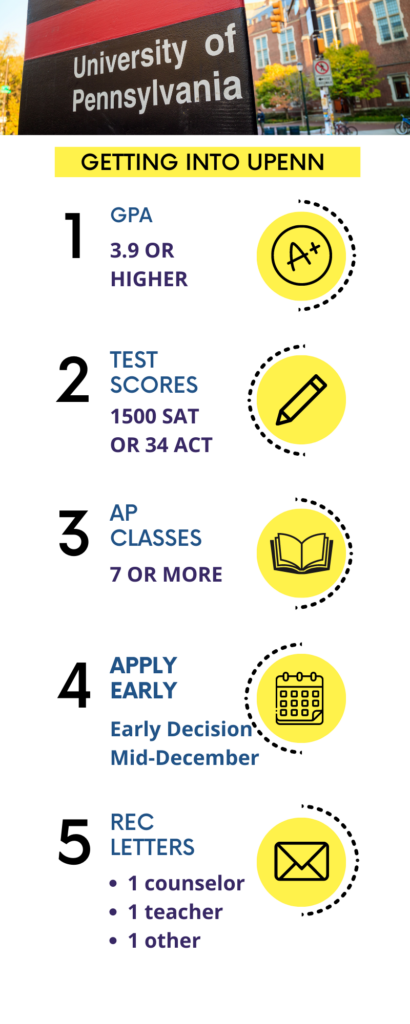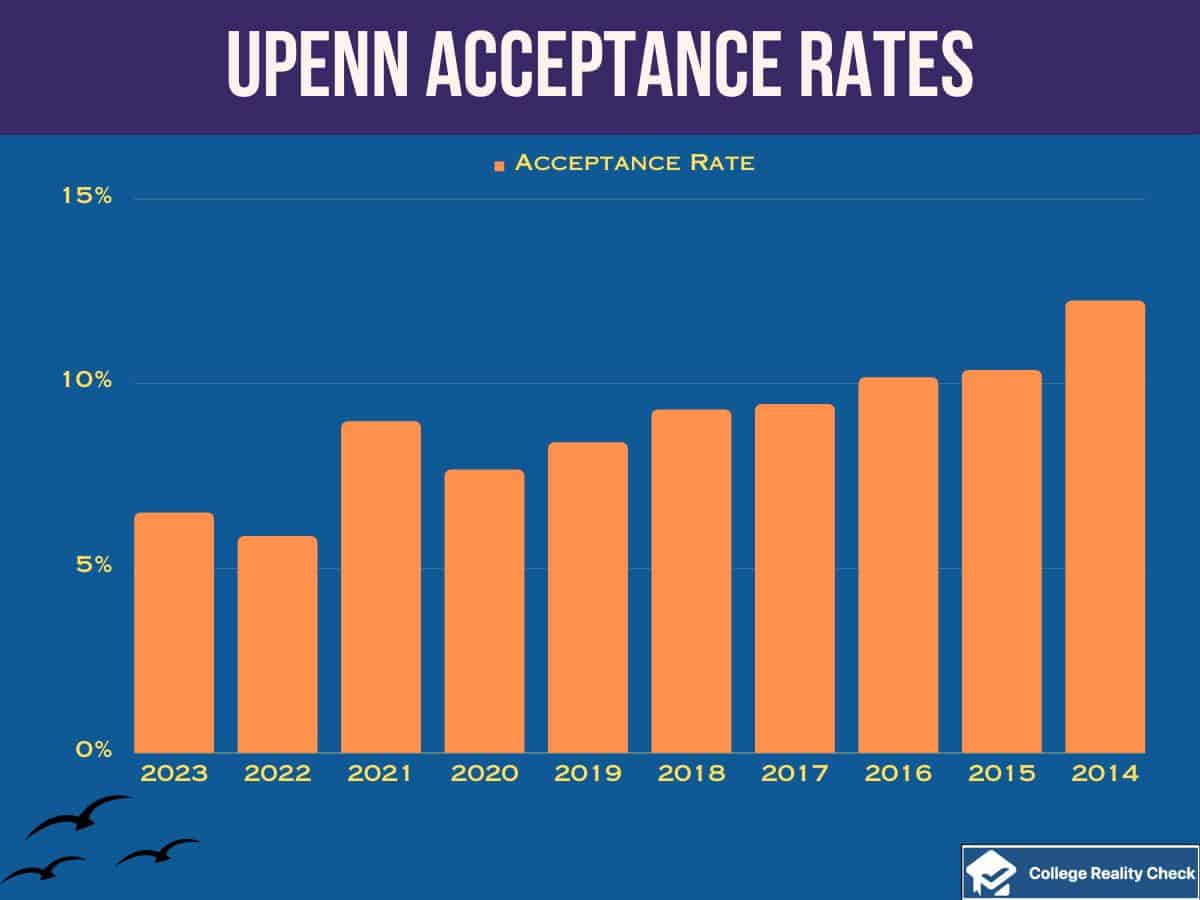How to Get Into University of Pennsylvania: 6 Admission Tips and Hacks
Attending an Ivy League school is the dream of many college-bound teens.
Academic excellence, renowned faculty members, top-notch facilities, innovative research opportunities, and a strong alumni network — the Ivy Leagues offer just about everything students with big dreams look for.
With single-digit acceptance rates, however, getting into them is hard!
The University of Pennsylvania is one of the hardest to get into among those elite schools.
A private research institution in Philadelphia, Pennsylvania, UPenn is #15 in Best Global Universities by US News and #16 in Times Higher Education World University Rankings.
Its admissions officers consider traditional measures of academic achievement such as:
- Academic rigor
- High school GPA
- Test scores
- Application essays
- Recommendation letters
- Class rank
They also consider various non-academic criteria, with character, talent, and extracurriculars having the most weight in the admissions process.
Upenn does not consider religious affiliation and demonstrated interest.

Just How Hard is It to Get In?
UPenn’s acceptance rate is 7%.
With over 90% of applicants downright rejected, it’s plain to see that getting an offer to enroll can be a colossal undertaking, especially for average and below-average students.
The table below shows how consistently Penn accepts only a tiny fraction of applicants each time:
| Academic Year | Applicants | Admits | Acceptance Rate |
|---|---|---|---|
| 2022 to 2023 | 54,588 | 3,549 | 6.50% |
| 2021 to 2022 | 56,332 | 3,304 | 5.86% |
| 2020 to 2021 | 42,205 | 3,789 | 8.97% |
| 2019 to 2020 | 44,961 | 3,446 | 7.66% |
| 2018 to 2019 | 44,491 | 3,740 | 8.40% |
| 2017 to 2018 | 40,413 | 3,757 | 9.29% |
| 2016 to 2017 | 38,918 | 3,674 | 9.44% |
| 2015 to 2016 | 37,268 | 3,787 | 10.16% |
| 2014 to 2015 | 35,866 | 3,718 | 10.36% |
| 2013 to 2014 | 31,282 | 3,830 | 12.24% |

So, what type of students get into Penn?
It looks for students who aim to develop and polish their talents and abilities within its liberal arts-based, practical, and interdisciplinary academic environment.
UPenn adds that it looks for those who emulate its founder, Benjamin Franklin, by applying their knowledge in service to society, including Philadelphia and the rest of the planet.
Of course, it’s an unstated rule that you should be a high-performing student.
Top Secrets to Getting Accepted to Penn
It’s not enough that you understand how challenging it can be to get into UPenn.
Knowing how to increase your chances of getting admitted is a must, too!
Given how extremely selective UPenn is, your college application must be extraordinary — it has to stand out from the 50,000+ applications it receives each admissions cycle.
Get a Near-Perfect or a Perfect Cumulative GPA
Before you submit your Common App or Coalition App, there’s one very important thing to check:
Your high school GPA should be 3.9 or higher.
Approximately 90% of first-time, first-year students Penn admits have GPAs between 3.75 and 4.0 — admitted ones with GPAs lower than 3.9 must have something else in their applications that’s awesome.
However, to increase your admissions success, aim for at least a 3.9 GPA.
I checked UPenn’s Common Data Set (CDS) reports for the past 10 academic years. I learned that admitted freshmen had an average high school GPA that ranged from 3.85 to 3.94.
Graduate at the Top of Your High School Class
It may not be as significant as GPA, but class rank still matters in Penn’s admission process.
Around 93% of admitted first-time, first-year students graduated in the top 10% of their high school class — all 100% of them graduated in the top 50% of their graduating class.
But don’t erase UPenn from your college list just because your high school doesn’t have a ranking system for its students like many small and private competitive high schools in America.
Its admissions officers won’t penalize you for it!
However, with one less information upon which they can base their decision, they might focus on another component of your University of Pennsylvania application that can make up for it.
So, in other words, prove that you’d be at the top of your class if your school ranked everyone.
Don’t Just Take AP Classes — Take Challenging AP Classes
Academic rigor is another major factor in Penn Admissions.
While they do not require you to take AP classes in high school, admissions officers recommend that you do so to help develop your college-level academic skills and become more confident as a college-bound student.
The consensus is that you should take at least seven AP classes if you dream of being an Ivy Leaguer.
However, it’s not enough that you register for numerous AP classes throughout your high school career — you should go for some of the most challenging ones available for an exceptional college application.
Does UPenn give credit to AP exams?
The University of Pennsylvania offers credit for qualifying AP exam scores. It means that not all AP exams will earn you credit, and not all AP exam scores will earn you credit.
No other AP exam score will let you obtain college credit than a 5.
Check out the following table if you’re interested in earning college credit through AP exams:
| AP Exam Name | Minimum Score | Number of Credits |
|---|---|---|
| AP Calculus BC | 5 | 1 |
| AP Chemistry | 5 | 1 |
| AP Chemistry | 5 | 1 |
| AP Computer Science A | 5 | 1 |
| AP French Language and Culture | 5 | 1 |
| AP German Language and Culture | 5 | 1 |
| AP Italian Language and Culture | 5 | 1 |
| AP Japanese Language and Culture | 5 | 1 |
| AP Latin | 5 | 1 |
| AP Physics 1 | 5 | 1.5 |
| AP Physics 2 | 5 | 1.5 |
| AP Physics C: Electricity and Magnetism | 5 | 1.5 |
| AP Physics C: Mechanics | 5 | 1.5 |
| AP Spanish Language and Culture | 5 | 1 |
| AP Spanish Literature and Culture | 5 | 1 |

Submit Three Glowing Recommendations
Penn’s admissions officers would like to know applicants from the perspectives of three people.
That’s why you’ll need to submit three letters of recommendation, each coming from some of the most notable individuals on your high school campus and the most influential on your high school career.
Recommendations allow UPenn to understand you as a student and how you interact with others.
Here are the three recommendation letters to submit:
- Counselor recommendation
- Teacher recommendation
- Other recommendation
Please note that the other recommendation isn’t optional — it’s an application requirement.
It can come from another teacher, thus serving as a second teacher recommendation.
However, it can also be a non-academic recommendation, which means that you can ask a non-teacher, like a coach or mentor, to write it — Penn does not have a preference between a teaching and non-teaching person.
Just a few tips before you start approaching people for recommendations:
- Try to pick a recent teacher
- Go for a teacher in your area of academic interest
- Look for a recommender who knows you well
- Provide recommenders with your resume, list of past projects, etc.

Essays: They Say What You Can Bring to the Community
UPenn makes it clear that its admissions officers read essays carefully.
That’s because they reveal:
- How applicants think
- How applicants see the world
- What applicants value
- What applicants might bring to the Penn community
You must submit a personal essay, also known as the Common App essay or Coalition App essay, which should be no less than 250 words short and no more than 650 words long.
You must also answer three short answer prompts, which are UPenn-specific.
In answering them, make sure that you answer the prompt. Also, remember to explain why you are applying to Penn and want to enroll in the undergraduate program of your liking.
Don’t Test Admissions Officers With Low Test Scores
UPenn is a test-optional school.
Applicants who were able to take the SAT and ACT and are happy with their scores may choose to submit them; those who were unable to do so or are unhappy with their scores may apply without test scores.
It’s worth pointing out that not reporting yours won’t disadvantage you in the admissions process.
You are not alone if you prefer to keep your standardized test scores to yourself: among the most recent first-year admits, only 48% submitted their SAT scores, while only 23% submitted their ACT scores.
In case you decide to submit your SAT or ACT scores, check that they can help boost your college application and not bring down its overall value, which can put your acceptance at risk.
Let’s take a look at the composite test score ranges of admitted first-time, first-year students:
| Standardized Test | Score Range |
|---|---|
| SAT | 1500 to 1570 |
| ACT | 34 to 35 |
Maybe it’s not a great idea to submit your SAT or ACT scores if they are near or below the ideal range.
Read Next: How to Get Into Princeton University
Disclaimer: The views and opinions expressed in this article are those of the authors and do not necessarily represent those of the College Reality Check.






